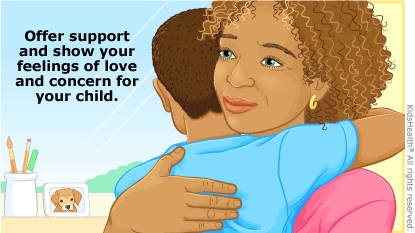Depression: How to Care for Your Child
Depression is more than just feeling sad or being in a bad mood once in a while. It's when those feelings don't seem to go away or they make everyday life difficult. Treatment usually can help depression get better. You can work with your health care providers to help your child.


-
Make sure your child takes any prescribed medicines as directed.
-
If your child takes medicines, watch for side effects. Very rarely, some medicines for depression can make symptoms worse or lead to suicidal thoughts or actions. If you notice your child's symptoms getting worse or you're worried they may hurt themselves, call your health care provider right away.
-
Make an appointment with a psychiatrist (mental health doctor), therapist, or counselor as instructed by your health care provider.
Show your child you want to help:
-
Talk with your child about sadness and depression. Your child may not know why they are so sad or why things feel so hard. Tell your child often that you are there for support, whenever they need you.
-
Show your love. Depending on what your child is comfortable with, this might mean giving them a hug, spending time together, or listening to their feelings. Listen, comfort, offer your support, and show love.
-
Be gentle. Parents of children with depression sometimes mistake the depression for not trying, especially because depression can lead to problems at school. Your child may not be interested in school or other activities or might eat or sleep more than usual, but isn't doing this on purpose. Be understanding if your child doesn't have the energy to get out of bed, finish chores, or do homework.
-
Spend time together. Depression can lead to a loss of interest. But staying involved can improve mood in kids with depression. Encourage activities that were fun in the past and are physically active, social, relaxing, and satisfying (for example, playing sports or spending time with friends).
-
Help with problem-solving. Bullying, teasing, or other social problems may trouble your child. Come up with possible solutions together (for example, ways to deal with a bully).

-
Your child's mood does not improve or gets worse.
-
You think your child may be physically hurting themselves on purpose.
-
You're worried that your child is using alcohol or drugs. Depressed kids and teens are more likely to use alcohol and/or drugs than their peers.
-
Your child gets better, but then starts to seem depressed again.
-
Your child shows any warning signs of thinking about suicide, such as:
-
talking or writing about suicide or death to you or anyone else
-
talking about feeling hopeless
-
hinting that they may not be around for long
-
giving away their things

You are worried that your child will try to commit suicide (end their life) or they have talked about a specific plan for suicide.
You or your child also can call or text the National Suicide Prevention Lifeline at 988.

What causes depression? Different things can lead to depression. There is no single cause. Some people are more likely to get depression because it runs in their family. They may have other family members who have been depressed.
Some people get depressed after going through loss, trauma, health problems, or other hardships. Sometimes it's not clear what led to the depression.
What are the symptoms of depression? Symptoms of depression can include:
-
feelings of sadness, irritability, hopelessness, guilt, or worthlessness
-
feeling tired or having little energy
-
changes in appetite or sleep habits
-
trouble concentrating or making decisions
-
thoughts of death or suicide
-
loss of interest in activities previously enjoyed
-
not wanting to be around friends or family
-
moving or speaking so slowly that other people have noticed
-
being restless and moving around a lot more than usual
Some kids and teens with depression do not seem sad to their parents or other adults — they simply seem much more irritable or angrier than usual. If asked, they might not describe themselves as feeling sad or down.
Depression can last for a short time or go on for a long time, and can be mild or severe. It's important to treat depression when it happens.
How is depression treated? Depression can be treated with medicine, therapy, or both together. Therapy is when someone talks to a therapist about their feelings and learns skills to feel better.